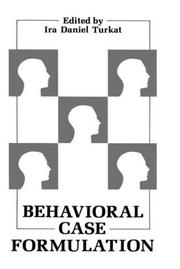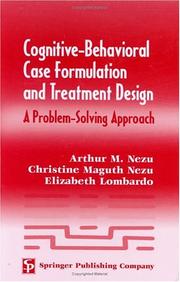| Listing 1 - 10 of 39 | << page >> |
Sort by
|

ISBN: 0306420473 1489936467 1489936440 Year: 1985 Publisher: New York (N.Y.): Plenum
Abstract | Keywords | Export | Availability | Bookmark
 Loading...
Loading...Choose an application
- Reference Manager
- EndNote
- RefWorks (Direct export to RefWorks)
Psychiatry --- Behavioral assessment --- -Medicine and psychology --- Mental health --- Psychology, Pathological --- Assessment of behavior --- Behavior assessment --- Behavioral analysis --- Behavioral evaluation --- Psychodiagnostics --- Psychology --- Case formulation --- Methodology --- -Case formulation --- Case conceptualization in psychiatry --- Case formulation in psychiatry --- Conceptualization of cases in psychiatry --- Formulation of cases in psychiatry --- Case conceptualization
Book
ISBN: 9781606230725 1606230727 Year: 2009 Publisher: New York Guilford
Abstract | Keywords | Export | Availability | Bookmark
 Loading...
Loading...Choose an application
- Reference Manager
- EndNote
- RefWorks (Direct export to RefWorks)
Cognitive Therapy --- Psychiatry --- Cooperative Behavior --- Psychological Theory --- Case formulation --- Cognitive therapy. --- Cognitive Therapy. --- Cooperative Behavior. --- Psychological Theory. --- Klinische psychologie --- Case formulation. --- psychotherapie --- psychotherapie. --- Cognitive therapy --- Case conceptualization in psychiatry --- Case formulation in psychiatry --- Conceptualization of cases in psychiatry --- Formulation of cases in psychiatry --- Cognitive-behavior therapy --- Cognitive-behavioral therapy --- Cognitive psychotherapy --- Case conceptualization --- Psychotherapy --- Methodology

ISBN: 1281811335 9786611811334 0826122868 9780826122865 082612285X 9780826122858 Year: 2004 Publisher: New York, NY Springer Pub. Co.
Abstract | Keywords | Export | Availability | Bookmark
 Loading...
Loading...Choose an application
- Reference Manager
- EndNote
- RefWorks (Direct export to RefWorks)
This user-friendly guide will help the clinician develop Cognitive-Behavioral treatment plans for 11 common psychological disorders (e.g., major depressive disorder, generalized anxiety, borderline personality disorder, anger problems). Based on a problem-solving model and empirical literature, the authors focus on two major clinical tasks involved in this process: case formulation and treatment design. They delineate short-term goals, long-term goals, treatment targets, and potential interventions. Appendices include ""quick guides to CBT treatment planning"" for the 11 disorders and selected
Cognitive therapy. --- Psychiatry --- Problem-solving therapy. --- Cognitive-behavior therapy --- Cognitive-behavioral therapy --- Cognitive psychotherapy --- Psychotherapy --- Problem-centered therapy --- Problem-oriented therapy --- Mediation therapy --- Differential therapeutics in psychiatry --- Case conceptualization in psychiatry --- Case formulation in psychiatry --- Conceptualization of cases in psychiatry --- Formulation of cases in psychiatry --- Case formulation. --- Differential therapeutics. --- Methodology --- Case conceptualization

ISBN: 1452231753 1452266832 9781452266831 9781452231754 0761921885 9780761921882 Year: 2002 Publisher: Thousand Oaks, Calif. Sage Publications
Abstract | Keywords | Export | Availability | Bookmark
 Loading...
Loading...Choose an application
- Reference Manager
- EndNote
- RefWorks (Direct export to RefWorks)
Few resources exist to help students and mental health clinicians with the daunting task of learning how to synthesize test data from numerous instruments into a meaningful treatment plan and strategy for a client. This book aims to address that need.
Psychological tests. --- Psychometrics. --- Measurement, Mental --- Measurement, Psychological --- Psychological measurement --- Psychological scaling --- Psychological statistics --- Psychology --- Psychometry (Psychophysics) --- Scaling, Psychological --- Psychological tests --- Scaling (Social sciences) --- Mental tests --- Psychological assessment --- Tests, Psychological --- Testing --- Clinical psychology --- Educational tests and measurements --- Measurement --- Scaling --- Methodology --- Psychiatry --- Case formulation. --- Case conceptualization in psychiatry --- Case formulation in psychiatry --- Conceptualization of cases in psychiatry --- Formulation of cases in psychiatry --- Case conceptualization

ISBN: 1572304626 Year: 1999 Publisher: New York (N.Y.): Guilford
Abstract | Keywords | Export | Availability | Bookmark
 Loading...
Loading...Choose an application
- Reference Manager
- EndNote
- RefWorks (Direct export to RefWorks)
Behavioral assessment --- Interviewing in psychiatry --- Personality assessment --- Psychiatry --- -Psychotherapist and patient --- #PBIB:1999.4 --- Patient and psychotherapist --- Psychoanalyst and patient --- Patients --- Medicine and psychology --- Mental health --- Psychology, Pathological --- Assessment of behavior --- Behavior assessment --- Behavioral analysis --- Behavioral evaluation --- Psychodiagnostics --- Psychology --- Assessment of personality --- Personality diagnosis --- Personality evaluation --- Psychiatric interviewing --- Interviewing --- Interviewing in mental health --- Medical history taking --- Psychotherapist and patient --- Psychotherapy --- Case formulation --- Methodology --- Behavioral assessment. --- Interviewing in psychiatry. --- Personality assessment. --- Psychotherapist and patient. --- Psychoanalyse --- Case formulation. --- klinische beschouwingen --- klinische beschouwingen. --- Case conceptualization in psychiatry --- Case formulation in psychiatry --- Conceptualization of cases in psychiatry --- Formulation of cases in psychiatry --- Case conceptualization
Book
ISBN: 3030635872 3030635864 Year: 2021 Publisher: Cham, Switzerland : Springer,
Abstract | Keywords | Export | Availability | Bookmark
 Loading...
Loading...Choose an application
- Reference Manager
- EndNote
- RefWorks (Direct export to RefWorks)
This book reasserts the importance of case formulation as the first step in implementing effective cognitive behavioral therapies (CBT), centering it as the main operative tool of CBT approaches by which the therapist handles the whole psychotherapeutic process. Chapters discuss specific CBT interventions and components of the treatment, aspecific factors including therapeutic alliance and relationship, and theoretical and historical background of CBT practices. In addition, the book assumes that in CBTs the case formulation is a procedure which is continuously shared and reevaluated between patient and therapist throughout the course of treatment. This aspect is increasingly becoming the distinguishing feature of CBT approaches as it embodies CBT's basic tenets and implies full confidence in patients' conscious agreement, transparent cooperation and explicit commitment with CBT's model of clinical change.
Cognitive therapy. --- Cognitive-behavior therapy --- Cognitive-behavioral therapy --- Cognitive psychotherapy --- Psychotherapy --- Psychiatry --- Case formulation. --- Teràpia cognitiva --- Estudi de casos --- Formulació clínica --- Case conceptualization in psychiatry --- Case formulation in psychiatry --- Conceptualization of cases in psychiatry --- Formulation of cases in psychiatry --- Case conceptualization --- Methodology --- Formulació clínica de casos --- Formulació de cas --- Formulació de casos --- Formulació de casos clínics --- Psicodiagnòstic --- Casos --- Psicoteràpia cognitiva --- Terapèutica cognitiva --- Teràpia cognitiva conductual --- Teràpia cognitiva de la conducta --- Teràpia cognitiva basada en l'atenció plena --- Teràpia cognitiva per a adolescents --- Teràpia cognitiva per a infants --- Teràpia d'acceptació i compromís --- Teràpia d'exposició --- Teràpia racional emotiva conductual --- Estudis de casos

ISBN: 3540122516 3642690025 3642690009 9783540122517 Year: 1983 Volume: 12 Publisher: Berlin Springer
Abstract | Keywords | Export | Availability | Bookmark
 Loading...
Loading...Choose an application
- Reference Manager
- EndNote
- RefWorks (Direct export to RefWorks)
Cognitive psychology --- Lexicology. Semantics --- Psycholinguistics --- Concept Formation. --- Semantics. --- Semantic --- Concept Formations --- Formation, Concept --- Formations, Concept --- Semantics --- Congresses --- Congresses. --- Language acquisition --- Meaning (Psychology) --- Concepts --- Concept Learning --- Conceptualization --- Learning, Concept --- Concept Formation --- Concept Acquisition --- Acquisition, Concept --- Acquisitions, Concept --- Concept Acquisitions
Book
ISBN: 311040673X 3110406837 3110403714 9783110403718 Year: 2015 Publisher: Berlin, Germany ; Boston, Massachusetts : De Gruyter,
Abstract | Keywords | Export | Availability | Bookmark
 Loading...
Loading...Choose an application
- Reference Manager
- EndNote
- RefWorks (Direct export to RefWorks)
Quantification is central to human experience (cf. Aristotle's Organon): the most basic aspects of human life and reasoning involve quantity assessment. This study sheds lights on a highly frequent way to express quantification in Spanish, viz. the binominal quantifier (e.g. un aluviónN1 de llamadasN2 'a flood of calls') which assesses the quantity of N2 in terms of N1. This volume offers a corpus-based, cognitive-functional analysis of binominal quantifiers (BQ) in Spanish. The first part is dedicated to the development of BQs and starts from the assumption that BQs are cross-linguistically involved in grammaticalization. This monograph frames the history of BQs in Spanish in terms of constructional levels of change and highlights the complex interplay between analogical thinking and conceptual persistence. The second part motivates both the ample variation in the paradigm of quantifying nouns and their combinatorial pattern by the very same mechanism of conceptually-driven analogy. The study thus yields an innovative functional model of BQs in Spanish, in synchrony and in diachrony, with major implications for reference grammars and theory building.
Spanish language --- Castilian language --- Romance languages --- Nominals. --- Qualifiers. --- Topic and comment. --- Spanish language - Nominals --- Spanish language - Qualifiers --- Spanish language - Topic and comment --- Cognitive Semantics. --- Cognitive-functional Linguistics. --- Conceptualization in Quantification. --- Grammaticalization (of Constructions).
Book
Abstract | Keywords | Export | Availability | Bookmark
 Loading...
Loading...Choose an application
- Reference Manager
- EndNote
- RefWorks (Direct export to RefWorks)
Big data are changing the way we work as companies face an increasing amount of data. Rather than replacing a human workforce or making decisions obsolete, big data are going to pose an immense innovating force to those employees capable of utilizing them. This book intends to first convey a theoretical understanding of big data. It then tackles the phenomenon of big data from the perspectives of varied organizational theories in order to highlight socio-technological interaction. Big data are bound to transform organizations which calls for a transformation of the human resource department. The HR department's new role then enables organizations to utilize big data for their purpose. Employees, while remaining an organization's major competitive advantage, have found a powerful ally in big data.
Based --- Complex --- Conceptualization --- Data --- Data Constructivism --- Ethical Data Usage --- Homeodynamic Organization --- Human --- Human-Data Interaction --- Management --- New World of Work --- Organizations --- Resource --- Role --- Scholz --- Socio-Technological Concurrence --- Stein --- Systems --- Theory --- Tobias --- Volker
Book
Abstract | Keywords | Export | Availability | Bookmark
 Loading...
Loading...Choose an application
- Reference Manager
- EndNote
- RefWorks (Direct export to RefWorks)
Big data are changing the way we work as companies face an increasing amount of data. Rather than replacing a human workforce or making decisions obsolete, big data are going to pose an immense innovating force to those employees capable of utilizing them. This book intends to first convey a theoretical understanding of big data. It then tackles the phenomenon of big data from the perspectives of varied organizational theories in order to highlight socio-technological interaction. Big data are bound to transform organizations which calls for a transformation of the human resource department. The HR department's new role then enables organizations to utilize big data for their purpose. Employees, while remaining an organization's major competitive advantage, have found a powerful ally in big data.
Based --- Complex --- Conceptualization --- Data --- Data Constructivism --- Ethical Data Usage --- Homeodynamic Organization --- Human --- Human-Data Interaction --- Management --- New World of Work --- Organizations --- Resource --- Role --- Scholz --- Socio-Technological Concurrence --- Stein --- Systems --- Theory --- Tobias --- Volker
| Listing 1 - 10 of 39 | << page >> |
Sort by
|

 Search
Search Feedback
Feedback About UniCat
About UniCat  Help
Help News
News